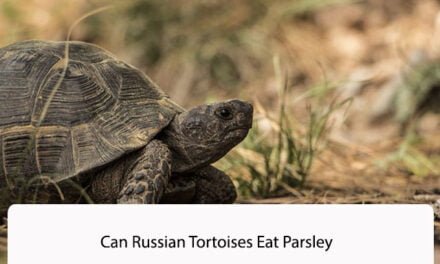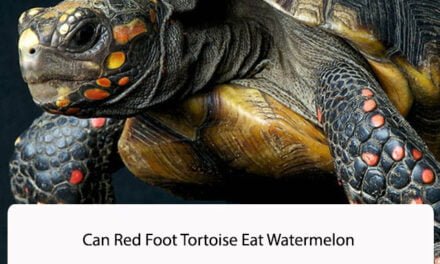Sulcata tortoises are known for being herbivorous reptiles that enjoy a variety of fruits and vegetables. However, not all produce is safe for them to consume. One common question among sulcata owners is whether or not their tortoise can eat brussel sprouts.
Brussel sprouts are a type of vegetable that belongs to the same family as cabbage and broccoli. They are a good source of vitamins and minerals, making them a healthy addition to any diet. However, when it comes to feeding them to sulcata tortoises, there are a few things to consider.
Firstly, it is important to note that sulcata tortoises have a unique digestive system that requires a specific balance of nutrients. Feeding them too much of one type of food can lead to health issues such as shell deformities or metabolic bone disease. Therefore, it is important to ensure that any new food added to their diet is given in moderation and as part of a balanced diet.
Understanding Sulcata Tortoises

Sulcata tortoises are one of the largest tortoise species in the world. They are native to the Sahel region of Africa, which is located south of the Sahara Desert. These tortoises are herbivores, which means that they eat only plants. They have a lifespan of up to 70 years and can grow up to 30 inches in length and weigh up to 150 pounds.
Sulcata tortoises are known for their hardy nature, but they require specific care to stay healthy. They need a spacious enclosure with a basking area, a shaded area, and a water source. They also require a varied diet that includes a mix of grasses, weeds, and leafy greens.
It’s important to note that sulcata tortoises are not suitable pets for everyone. They require a significant amount of space and care, and they can live for several decades. Before deciding to adopt a sulcata tortoise, it’s essential to research their care requirements and ensure that you can provide them with a suitable habitat.
In the next section, we will explore whether or not sulcata tortoises can eat brussel sprouts, a common vegetable that many tortoise owners may be curious about.
Dietary Needs of Sulcata Tortoises
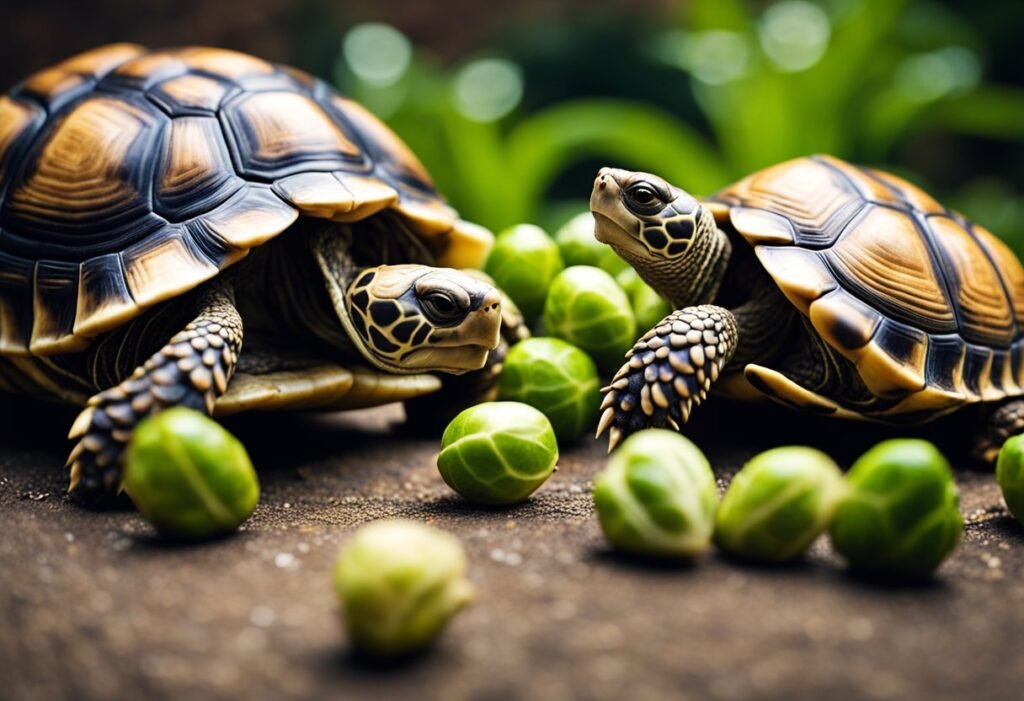
As responsible pet owners, we must ensure that our sulcata tortoises receive a balanced diet that meets their nutritional needs. In the wild, these tortoises consume a variety of plant materials, including grasses, weeds, and succulents. Therefore, it is important to replicate this diet in captivity.
A healthy diet for sulcata tortoises should consist of a variety of leafy greens, vegetables, and fruits. However, it is important to note that not all vegetables and fruits are safe for tortoises to consume. For example, some vegetables, such as spinach and rhubarb, contain high levels of oxalic acid, which can interfere with calcium absorption and lead to health problems.
When it comes to feeding brussel sprouts to sulcata tortoises, it is generally safe to do so in moderation. Brussel sprouts are a good source of vitamin C, vitamin K, and fiber, which are all important nutrients for tortoises. However, they should not make up the majority of a tortoise’s diet and should be fed in small quantities as part of a varied diet.
It is also important to ensure that sulcata tortoises have access to clean, fresh water at all times. In addition, they require exposure to UVB light in order to properly metabolize calcium and maintain healthy shell growth.
Overall, providing a balanced and varied diet, along with access to clean water and UVB light, is essential for the health and well-being of sulcata tortoises.
Can Sulcata Tortoises Eat Brussel Sprouts
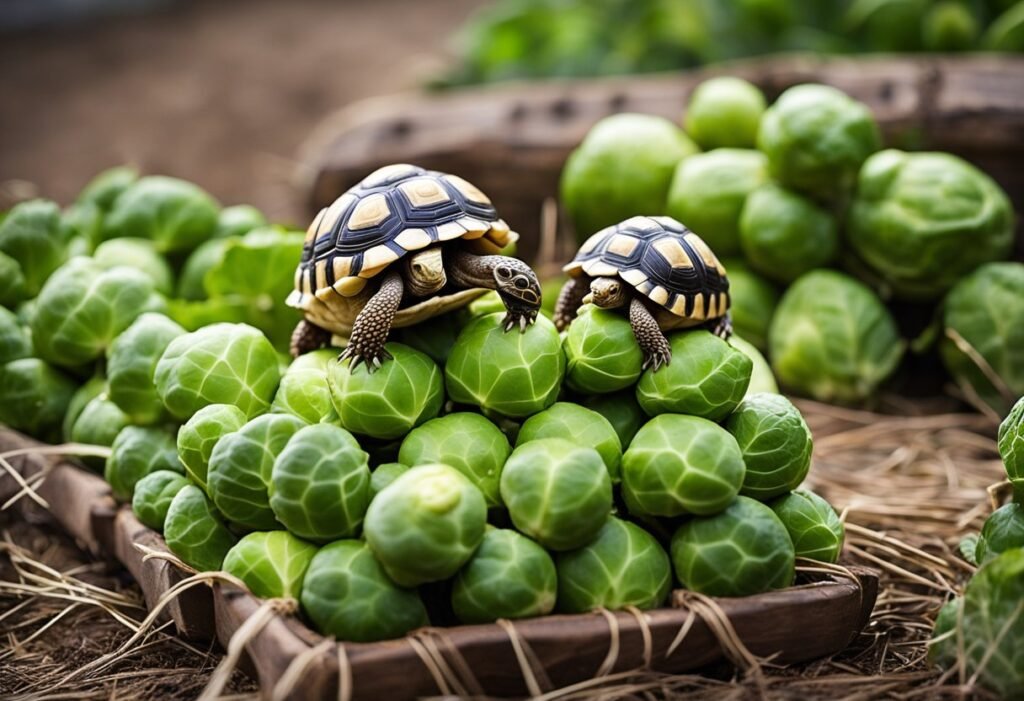
Brussel sprouts are a popular vegetable among humans, but can Sulcata tortoises eat them too? In this section, we will explore the nutritional value of brussel sprouts and the potential health impact they may have on Sulcata tortoises.
Nutritional Value of Brussel Sprouts
Brussel sprouts are a great source of vitamins and minerals, including vitamin C, vitamin K, folate, and fiber. They also contain antioxidants that can help protect against disease. However, they are also high in oxalates, which can bind to calcium and prevent its absorption.
Potential Health Impact
While brussel sprouts can provide some nutritional benefits, they should not be a regular part of a Sulcata tortoise’s diet. As mentioned, the high oxalate content can interfere with calcium absorption, which can lead to metabolic bone disease. Additionally, Sulcata tortoises have a specialized digestive system that is designed to break down fibrous plant material, but they may have difficulty digesting the tough leaves of brussel sprouts.
In conclusion, while brussel sprouts are not toxic to Sulcata tortoises, they should be fed in moderation, if at all. It is important to provide a balanced diet that meets all of their nutritional needs.
Alternatives to Brussel Sprouts for Sulcata Tortoises
When it comes to feeding sulcata tortoises, variety is key. While brussel sprouts can be a nutritious addition to their diet, it’s important to offer a range of foods to ensure they are getting all the nutrients they need. Here are some alternatives to consider:
Leafy Greens
Leafy greens are a great source of fiber and vitamins for sulcata tortoises. Some options to consider include:
- Kale
- Collard greens
- Mustard greens
- Turnip greens
- Dandelion greens
It’s important to note that some leafy greens, such as spinach, contain high levels of oxalates which can bind calcium and lead to health issues. As a result, it’s best to offer a variety of greens and rotate them regularly.
Vegetables
In addition to brussel sprouts, there are many other vegetables that can be offered to sulcata tortoises. Some options to consider include:
- Carrots
- Squash
- Zucchini
- Bell peppers
- Cucumber
It’s important to avoid vegetables that are high in oxalates or goitrogens, such as broccoli, cauliflower, and kale.
Fruits
While fruits should be offered in moderation due to their high sugar content, they can be a tasty treat for sulcata tortoises. Some options to consider include:
- Apples
- Berries
- Mango
- Papaya
- Watermelon
It’s important to avoid fruits that are high in oxalates, such as rhubarb and figs.
By offering a variety of leafy greens, vegetables, and fruits, you can ensure that your sulcata tortoise is getting all the nutrients they need to thrive.
Feeding Guidelines for Sulcata Tortoises
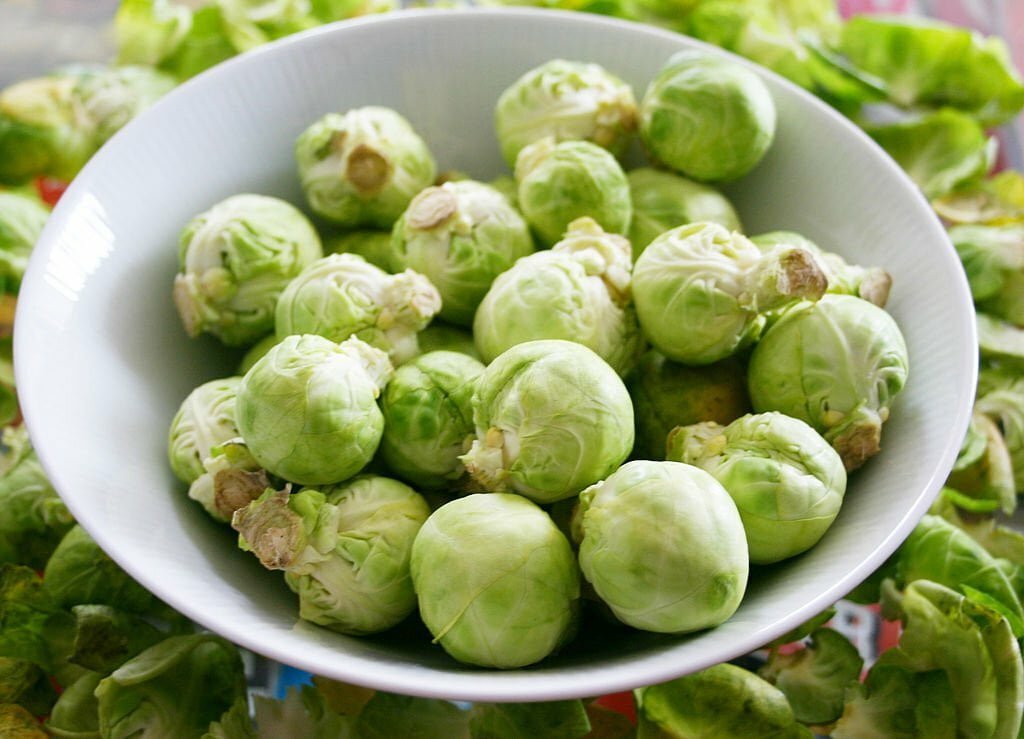
When it comes to feeding sulcata tortoises, it is important to provide them with a balanced and varied diet to ensure they receive all the necessary nutrients. While they are known to be herbivores, not all vegetables and fruits are safe for them to consume.
One vegetable that is often asked about is brussel sprouts. While they are not toxic to tortoises, they should only be fed in moderation. Brussel sprouts contain a high amount of oxalic acid, which can bind to calcium and prevent it from being absorbed properly. This can lead to metabolic bone disease and other health issues.
It is recommended to feed brussel sprouts as an occasional treat, rather than a regular part of their diet. When feeding, make sure to chop them into small pieces to prevent choking and always wash them thoroughly before serving.
In general, a balanced diet for sulcata tortoises should consist of a variety of dark leafy greens such as kale, collard greens, and dandelion greens. They can also be fed other vegetables like carrots, squash, and sweet potatoes, as well as some fruits like strawberries and melons.
It is important to avoid feeding them foods high in protein, such as meat and dairy products, as they can cause health issues. Additionally, avoid feeding them foods high in oxalic acid, such as spinach and beet greens, in large quantities.
Overall, it is important to do your research and consult with a veterinarian or experienced tortoise owner before introducing new foods into your sulcata tortoise’s diet. By providing a balanced and varied diet, you can help ensure a healthy and happy life for your tortoise.
Frequently Asked Questions
What vegetables can Sulcata tortoises eat?
Sulcata tortoises are herbivores and can eat a variety of vegetables. Some of the best vegetables for Sulcata tortoises include collard greens, dandelion greens, mustard greens, and turnip greens. They can also eat other vegetables like kale, spinach, and carrots in moderation.
Can red eared sliders eat brussel sprouts?
Red eared sliders are omnivores and can eat both vegetables and protein sources. While they can eat brussel sprouts, it is not recommended to feed them too much of it. Red eared sliders should have a balanced diet that includes a variety of vegetables, fruits, and protein sources.
Are brussel sprouts safe for tortoises?
Brussel sprouts are safe for tortoises to eat in moderation. They are a good source of fiber and vitamin C. However, it is important to note that tortoises should not rely on brussel sprouts as their main source of nutrition.
Can desert tortoises eat brussel sprouts?
Desert tortoises are herbivores and can eat a variety of vegetables. While they can eat brussel sprouts, it is not recommended to feed them too much of it. Desert tortoises should have a balanced diet that includes a variety of vegetables, fruits, and hay.
What vegetables should tortoises avoid?
Tortoises should avoid vegetables that are high in oxalic acid, such as spinach and beet greens. They should also avoid vegetables that are high in phosphorus, such as broccoli and corn. Additionally, tortoises should not eat vegetables that are high in fat or sugar, such as avocados and tomatoes.
Can Sulcata tortoises eat zucchini?
Yes, Sulcata tortoises can eat zucchini in moderation. Zucchini is a good source of fiber and vitamin C. However, it should not be the main source of nutrition for Sulcata tortoises. They should have a balanced diet that includes a variety of vegetables, hay, and calcium supplements.




